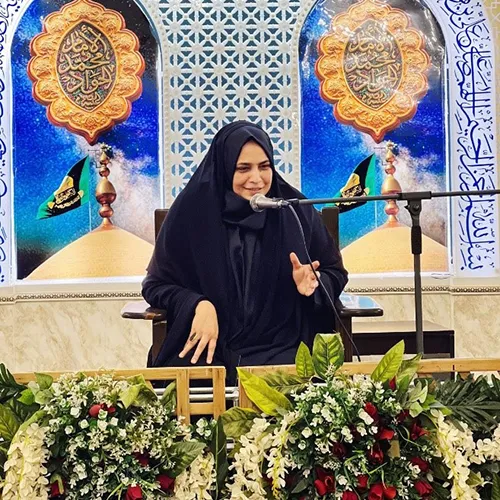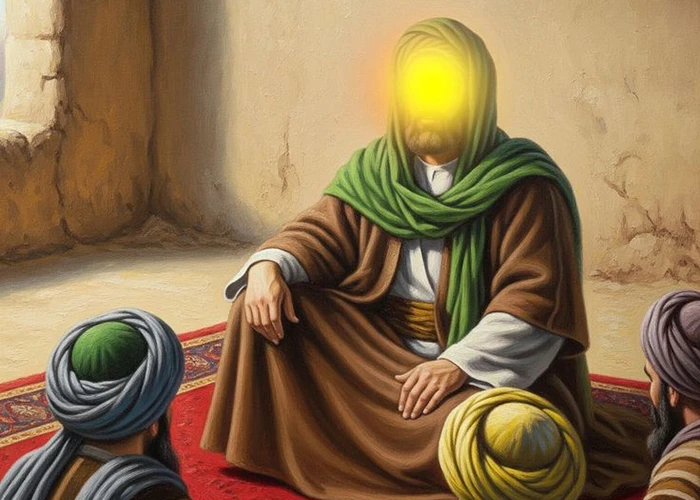Mrs. Seyedeh Abolai Sahab
On the eve of the second Fatimiyya mourning period, we visited a home in Reading where the lady of the house is a steadfast supporter of the Ahlul Bayt (peace be upon them) and an advocate of their teachings. Mrs. Seyedeh Abolai Sahab, also known as “Gole Zahra” (The Flower of Zahra), has raised her four children — three daughters and one son — in such a way that, alongside their academic achievements, each of them dedicates time outside their professional hours to serve as devotees of the Ahlul Bayt. In the warm and welcoming Husseiniyah that she has established in her home, they host lovers of the Ahlul Bayt with great devotion and care.
We found Mrs. Gole Zahra amidst her busy schedule, actively engaged in promoting Islamic teachings across European countries. Due to time constraints, she kindly responded to our questions remotely. We extend our heartfelt gratitude for her sense of responsibility and wish her, along with all Islamic preachers, health and success in this life and the hereafter.
- Please start by sharing when and where you began your academic and cultural activities. What areas are you currently focusing on the most?
As-salamu alaykum, I am a muballighah and try to serve the imam of our time with my little efforts. I try to educate our generation, young generation, and Muslim brothers and sisters, on how to become an active part of the society whilst holding Islamic values. I did my BSc degree from Pakistan in 1994, and then I got married and came to my practical life, but I didn’t stop reading books and practicing Islam. At the same time as being married, I was studying and I got my muballighah and alima degree from Jamia Khadijat-ul-Khubra in 2015, and then I did my master’s from Jamia-ul-Mustafa in Qom. Then I did another master’s in 2018 from Middlesex University in Islamic Studies, and nowadays I’m doing another master’s in Quranic exegesis, and trying my best to get knowledge as much as possible to serve the Holy Ahlul Bayt (as).
My focus is on the youth, where our youth, young generation, is very important, as they are the flag bearer of Islamic values. And it’s very important to educate them, to make them aware of their strength as a Muslim, and to encourage them to practice their Islamic values. So, this youth is the future of Islam.
- Considering the arrival of the days commemorating the martyrdom of Lady Fatimah Zahra (peace be upon her) and her introduction as a role model for Muslim women, what aspects of her life can be presented as an example for women and girls living in the West?
It’s a very important question, and we should talk about Lady Fatima Zahra (sa) as an exemplary figure for the entire women of the universe. And although Lady Fatima lived a short life, she was a role model in every aspect of life, in every time and era, especially for women.
If we talk about different aspects of her life, and how can we learn from her life, we find that the most important thing in her life was ibadah, and she was very well known by people of Medina, Mecca, and the surrounding areas, as a person who spends a lot of time in ibadah, a lot of time of the day, where she would do manajat, she would do her prayers, she would cry, she would recite tasbih, a very popular tasbih of Lady Zahra, among the whole Muslim world, after every salah, it’s recommended to read. So, it shows that its strength, its connection with Allah subhanahu wa ta’ala, and with that connection, we can relate to Lady Fatima Zahra, salamun alayha, and it can help to increase her ma’rifah in our hearts, because she is the one who taught us how to get near to Allah. She always stopped women not to go after worldly desires, and I remember one of the narrations that, one of the incidents, when someone asked Lady Zahra, salamun alayha, that, oh Lady Zahra, why don’t you like this world, or what do you like about this world? So, she smiled, and she said, there are three things I like about your world.
One, I like ibadah, and like to read Quran, because Quran brings me nearer to God, nearer to Allah subhanahu wa ta’ala, and it gives me peace in my heart. The second thing I like, I love about your world, is Prophet Muhammad (saw). When I look at her, when I look at his face full of noor, it gives me happiness and joy. And the third thing I like, and I love about your world is to love and to give people, to help them, to help needy, and be there for them when they need you. She always encouraged women to do ibadah, to help people, to read Quran.
So, I think women in the West, they should do this often, they should look after their salah, they should look after their Quran, they should look after their ibadah.
How do they spend their day? How do they make efforts to become practising for Muslim women, and how to become, how to come near to Allah. This is very important. So, this is one of the most important things in Lady Fatima’s life, and we should try to learn from her, from her personality.
She said a very important point, that when someone tries to go near to Allah subhanahu wa ta’ala, that love absorbs in one’s heart, and it has a very positive effect in one’s life. So, I think we should learn from this and try to go near to Allah subhanahu wa ta’ala. Hijab is a very important symbol of women in Islam, and Lady Fatima, salamu alayhi, always told women to wear hijab and look after it.
She always told them to do hijab with the best of their ability, and she told them the importance of hijab. She said that the best jewellery for women is their hijab, so look after it. So we should practice hijab in our daily lives, and give this important wajib of, one of the wajibat of Islam, because this is how we can show this world the best that we are Muslims, Muslim women, and we know how to hold our Islamic values, and it’s a very important message which we can convey to the rest of the world.
Lady Fatima, salamu alayhi, she always stood up against the cruelty and injustice, and a very popular example is her going to the court of the Khalifa of that time, and she unveiled the face of the enemy of Islam of that time. So, we should always think about what we do, and we should stand up against the oppression. We should not take the oppression for any reason, and we should speak up, and especially women in the West, they should speak up against the cruelty, against dishonesty, always speak up, speak up the truth, so this will help them to increase the respect in the eyes of others, and in the eyes of Allah subhanahu wa ta’ala.
- In your opinion, what is the most significant challenge that Muslim women in the West face today, and what solutions would you suggest addressing it?
So, if you ask me what the most challenging thing is, significant challenge, is hijab, wearing hijab. Because wearing hijab is becoming a significant challenge for women and girls in the West nowadays, today.
In the West where the way of life encourages to ignore the values of Islamic, values of Islam. And it’s already difficult to practise Islam where wearing hijab can add an extra challenge for women and girls. Because this is a constant reminder for the enemies of Islam that Islamic values are being practised.
Because if you wear hijab it’s very evident that you are practising Islam actively. This can increase friction and animosity against Muslims, and this discourages women wearing hijab. What they can do, they should stay strong and face this challenge by standing up against oppression and cruelty.
What they can do, they can do this by entering the sectors where there is significant exposure to Islam. And they can join public sectors like hospitals, journalism, they can go on TV, they can do different programmes. They can become an active part of the public and they can go to different places where hijab is evident.
What happens it will increase the confidence, and it will encourage to stick to their Islamic values. And, it will be acceptable, it will be acceptable by the other community, by other people. That Muslim women are wearing hijab, and it is part of their religion.
And because this is part of their religion it can contribute towards the Western society. There is another benefit of wearing hijab in this way that it will not hold them back by doing any activity what they want. And obviously as I said before that it will increase their confidence, and it will nourish Islamic values.
- Based on your experience teaching in Islamic educational centers, we would like to know your perspective on the quality of women’s participation in social and cultural activities, particularly in the field of religious education.
The answer to that is the effort in raising awareness is felt prominently nowadays. For example, we see them leading workshops for the youth and teaching them the importance of Islam.
They actively organise different events throughout the Islamic calendar and those events can be for both males and females and or females only where a variety of topics, issues and solutions are discussed. They address their social problems as well. They try to help them to overcome their fears, their tasks, their problems, their difficulties and it really helps them and encourages other people who are in trouble or in problem to overcome their problems.
And by having female holding these events empowers women as they can take lead in spreading the message of Islam and the message of Lady Fatima Zahra, salamu alaikum.
- Despite the prominent presence of women in cultural activities in these countries, there is not enough participation in Friday prayers. Please share your opinion on the reasons for this and provide your proposed solutions.
It is true that women do not attend as often as they should. This could be for a variety of reasons. One of the most important is the lack of emphasis on the importance of Friday prayers. Awareness has not been raised enough about their significance, so this is important. Sometimes women might make excuses, or they may genuinely be busy at home with household activities or their jobs, which is why they can’t attend. There might be some genuine reasons, but I think we need to increase our efforts in telling women and others about the importance of Friday prayers. In our lectures, we need more regular reminders to encourage people, especially women. If women were informed, they would understand the importance and could teach their children as well, making this a more regular part of their lives.
The summary of this conversation is that we should think about our religion with depth, strive to progress further, and work to understand the religion more deeply, because there is no limit to that. The sky is the limit when it comes to understanding religion. So, try to go deeper and deeper, and practice your religion as Lady Fatima Zahra (sa) taught us, so that, insha’Allah, we can become an active part of the Islamic society.
editor's pick
news via inbox
Subscribe to the newsletter.




